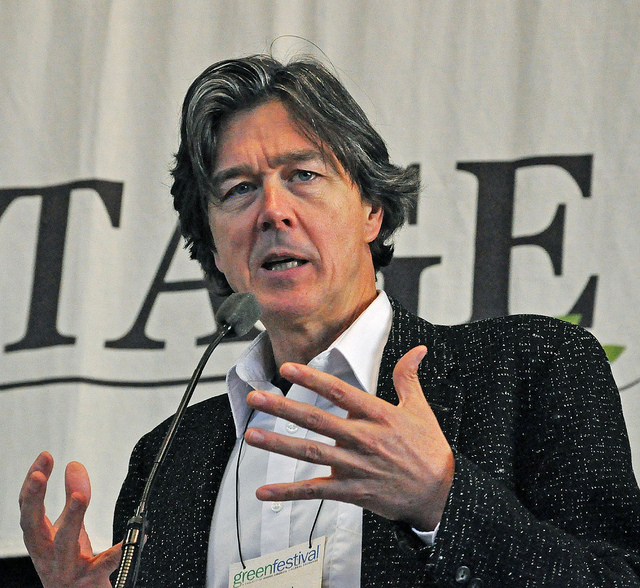August 21, 2015
The End of the Arctic? Ocean Could be Ice Free by 2015

So said well-known Warmist idiot Mark Hertsgaard in 2013 -- excerpt below. No need to say he is a false prophet, is there? Arctic ice has in fact become more extensive recently. What he says sounds so reasonable and well-informed. Paranoid schizophrenics often do. Though I think he is really just a publicity hound who will do and say whatever it takes to get noticed. He is known to be economical with the truth, cheerfully representing himself as being what he is not. Another one of his gems is that we are going to run out of wheat. He also fancies himself as Galileo but has got it exactly backwards. It is Hertsgaard who relies on conventional authority and who quotes not one single scientific fact. He's diligent in his evangelism, though. He has written six books including, most recently, “HOT: Living Through the Next 50 Years on Earth.”
Say goodbye to polar bears and a whole lot of ice. New research suggests the Arctic Ocean could be ice-free by 2015, with devastating consequences for the world. Can it be stopped?
Someone better tell Santa Claus. First it was polar bears that were threatened by global warming. Now it’s reindeer too. As temperatures in the Arctic skyrocket, reindeer are suffering staggeringly large, rapid population losses. “Herds of reindeer have declined by one-third since the 1990s as their access to food sources, breeding grounds and historic migration routes have been altered,” reports the environmental audit committee of the British Parliament.
The entire planet is getting hotter, but the top of the world is warming twice as fast as the global average. One leading expert, Peter Wadhams, a professor of ocean physics at the University of Cambridge, says the Arctic Ocean could be completely free of ice in summer as soon as 2015. An overheated Arctic in turn threatens catastrophic knock-on effects for the rest of the globe, including more extreme weather; faster sea level rise; and a higher chance of accelerating global warming to where it becomes unstoppable—what scientists refer to as “runaway” global warming.
Yet even as the number of reindeer in the Arctic is declining, the number of warships, cargo vessels and drilling rigs is increasing. In a little-noticed announcement, the United States Defense Secretary, Chuck Hagel, said on November 22 that the Pentagon is increasing its Arctic presence. Citing a “potential for tapping what may be as much as a quarter of the planet’s undiscovered oil and gas,” Hagel declared that the US “will remain prepared to detect, deter, prevent and defeat threats.” For his part, Russian president Vladimir Putin has pledged to turn the Arctic into “an international transport artery” that could cut one-third of the travel time and costs for trade between Europe and Asia compared to the traditional route through the Suez Canal. China, too, is setting its sights upon the Arctic. In May, it gained “observer” status on the Arctic Council—a high level intergovernmental group that coordinates international policies at the top of the world—despite its lack of territorial holdings in the Arctic. Chinese state-owned firms have also signed deals to exploit oil, gas and minerals in the Arctic.
Arctic ice cover has been declining since the 1950s, said professor Wadhams, who has led forty polar expeditions since first visiting the region in 1969. The biggest decline occurred in 2007, when the area covered by ice in summer decreased to roughly half of its usual amount. That left “an ocean of open water at the top of the planet—an unprecedented effect,” Wadhams said in an interview.
There was another large decrease in 2012, but Wadhams and other experts also worry that the thickness of Arctic ice is plummeting. Since satellites cannot accurately measure ice thickness, Wadhams has been going on board British nuclear submarines to map the ice from below with sonar. Arctic ice thickness has declined by 43 percent between the 1970s and 2000s, Wadhams has calculated, “an enormous loss” that he attributes to the higher temperatures of both air and sea in the Arctic.
More HERE
Go to John Ray's Main academic menu
Go to Menu of longer writings
Go to John Ray's basic home page
Go to John Ray's pictorial Home Page
Go to Selected pictures from John Ray's blogs